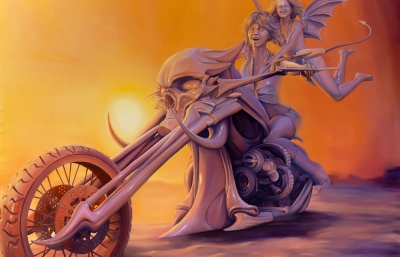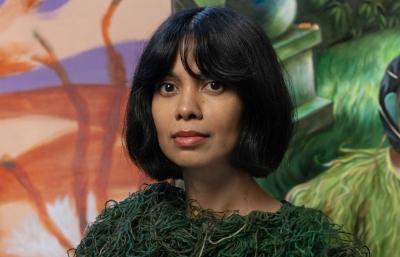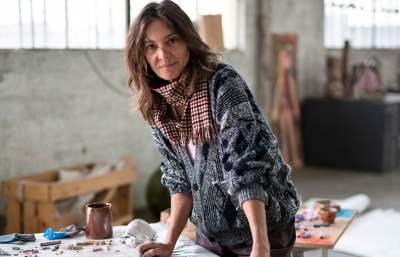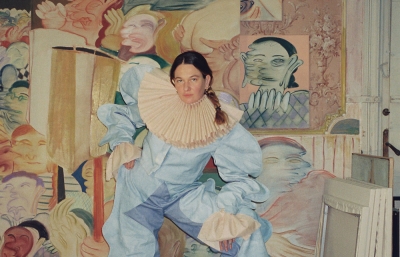Emma Stern
Complex Gods
Interview by Kristin Farr // Portrait by Max Knight
Lava Babies are an amalgamation of Emma Stern’s psyche, the construction of powerful figuration and her deep research and exploration of the trajectory of World Building over time. Lava Babies are a proposition, a statement that speaks to contemporary experience and obliterates the line between virtuality and reality. The following interview was conducted while riding jet-skis through international waters to avoid maritime law. The artist has recently predicted a few pop culture renaissance moments through a secret formula that capitalist execs would kill for, so we had to steer clear of prying ears.
Kristin Farr: Tell me how the internet impacted your development as an artist and person.
Emma Stern: More than anything, the internet has given me, and everyone else who uses it, a plethora of visual vocabularies to plunder and borrow from. I am obviously extremely influenced by the aesthetics and tropes of so many niche micro-communities of furries, 3D erotica and various fandoms, for example, which I would likely never have come into contact with were it not for the fact that I am very much online.
I will say though, my bookmarked tabs and search history is bonkers. My assigned NSA agent is probably very concerned.

Who is Amber?
Amber was one of the first avatars I created. I lovingly refer to all of my avatar muses as Lava Babies, and have come to understand them on the whole as an extended self-portraiture project because what is an avatar if not a fictionalized self-portrait? What’s cool is that they all reflect different little fragments of my personality, because after all, I contain multitudes! Amber represents my mischievous teenage self, kind of discovering her sexuality and the power it holds, while still innocent, in a non-ironic way.
Who is Emma?
Some weirdo art chick from Instagram.
Are you real or fake?
Nothing is real.

Here are some reasons why I wonder if you are a sentient AI: You’ve worn Y2K fashion your whole life, you repeat hot girl captions on your IG posts, and you claim your mom 3D-printed you. Care to comment? Can you foretell the future?
I am flattered by this assertion but am unfortunately biologically human—so far as I can tell.
I basically just dress like a slutty high schooler, so essentially the same clothes I wore when I was actually in high school. People tell me I dress like a girl from Euphoria High but frankly, that show totally appropriated Lava Baby culture, and I do plan to sue!
It is fascinating to me that the Y2K style is back now, and I have a loose theory about why. It has something to do with the perpetual pendulum of trends and fashion—there is a built-in nostalgia at play. Trends come back into style when the people who enjoyed them as kids grow up and have disposable income and want to feel like they did back then. This isn’t just true for Y2K style either—the bellbottoms of the ’90s were actually a throwback to the ’70s, right on schedule—but the Y2K thing is particularly interesting to me because it was that era that gave us the emergence of the internet when it was essentially just a fun and silly toy, and now it’s back in an era wherein we are entirely dependent on it. I think we are sentimental for the innocence of the internet that came with Y2K-era style.
It’s not so much that I can see the future, but if you follow my formula, you can indeed predict things with startling accuracy. Not to brag, but I did correctly predict the Sex and the City reboot, the Juicy Couture rebrand, and the return of French tip manicures months before the rollout.
Also, I do believe that the womb is the original 3D printer, albeit a very inefficient and flawed one. Perhaps obsolete soon.
How do you personally confuse the algorithm?
I listen to the Joe Rogan experience and also have Mark Fisher’s entire archive in my Audible library. Like I said, I contain multitudes. There is a feature on some social media platforms where you can look up the datapoints it is using to send you targeted adds, and mine thinks I am a Latina lesbian independent voter in my mid-twenties.

If you and the algorithm were animals, which species would you be?
I think it would be cool to be a virus, but biologists disagree as to whether viruses are animals. Last I heard the debate was getting contentious. Are computer viruses animals?
Y2K bugs? Let’s talk about avatars. I realize how challenging it is to make mine significantly different from myself, besides that she is way cuter. What thoughts do you have about alter-egos and what that idea means?
I am also guilty of this. The very first avatar I designed when I began this exploration was a literal self-portrait, and I prided myself on how much it resembled my IRL self. It occurred to me, after weeks spent tweaking the eyelashes and the tip of the nose to be my spitting image, how silly the whole process felt in hindsight. I could have been anything—I didn’t have to be human, or even biological. I could have been made of light, or of sound! This is when I started considering that avatars and their virtual environments don’t necessarily have to adhere to IRL laws of biology or chemistry or physics, because you can make up your own when you design a universe.
That being said, I acknowledge there is a blueprint that is really hard to get outside of when we create and design our virtual selves. We must be existentially attached to it. I was raised pretty religiously, and I always return to this concept from the Creation myth that, “God can only create in his own image,” and that seems connected to all this somehow.
Is that part of how your interest in biology and anatomy developed?
For me, the underlying interest has always been the body, either the experience of being inside it or trying to escape it. My dad was a biologist working in public health for the first part of my childhood, so I suppose it may have its roots there. But I had my first existential crisis when I was like, six years old, and I kind of feel like my interest in bodies may have been very informed by that early ego collapse and subsequent confusion. I also recall being really fascinated at a young age with the concept of evolution, which piqued my interest in the life sciences as well. I think the combination of both religious and scientific influences early on made me very curious about life as both a physical and philosophical concept, and ultimately about World Building, as it is applied in both the theory of evolution and in creation mythology and now, online.
Actually, I originally applied to art school as a medical illustration major before switching my concentration to painting. I don’t really feel like what I do now is that far off from medical illustration. It’s just that now I get to build my own bodies, which is way more fun than sticking to the blueprint.

Tell me what the landscape and tools are like in the software realm where you develop the figures. What’s it like, working in that dimension, and how does it affect your message?
Building my compositions in 3D is not a completely dissimilar experience to working from a live model or still life set up, with one major difference: When you are trying to paint a bowl of fruit, for example, you move your body around the bowl of fruit in order to understand it volumetrically and create a more convincing representation of it with your brush or pencil or whatever. In virtual 3D space, you move and rotate the object, not yourself. Try not getting a God complex after doing that for a few hours!
How long does it take to construct a muse in the software versus painting her?
It varies. Sometimes I go into it with a really clear idea of how I want her to look, other times I start from zero and just start playing around until something hits. I’ve been painting for almost twenty years and only began using technology in my art around five years ago, so the digital facet of my process does feel less like second nature, and requires more focus than the painting part, which is pure intuition at this point.
Your shows are often truly thematic. What upcoming tropes or themes are you exploring?
No spoilers! But I will say that incorporating a fictional narrative aspect into my painting exhibitions has been so much fun. When I learned that Quentin Tarantino writes a novel version of most of his movies, I got really inspired and have since then been writing what is essentially fanfic for all of my exhibitions while I’m making the paintings. Sometimes the paintings inspire the story, sometimes the other way around.

Tell me about your early studies of old master painters and if you feel your work is in dialogue with theirs, and if so, what would your figures say to theirs?
It’s true, I have a major soft spot for the Italian Renaissance guys, Caravaggio in particular. They all were super interested in biology and human anatomy, a lot of them hung out at hospitals to oversee the dissection of cadavers so they could paint people better, and learning that definitely drove my interest in human anatomy as well. I wouldn’t flatter myself by referring to my work as being in dialogue with theirs. What is more important to me is the broader history of painting and of figuration in general.
Part of what drives me to make the art that I do is the opportunity to recontextualize the things I find in whacky little corners of the internet. A centaur with huge boobs wearing a bikini may not be considered fine art when posted on an erotic 3D message board, but when it gets rendered in oil on canvas and hung on a gallery wall, all of a sudden it exists in the context of art history, of portraiture, and then suddenly there can be discourse surrounding it. That is the kind of dialogue I'm interested in.
Are you subverting or enforcing a specific kind of gaze in your work?
I get asked about “the male gaze” a lot in relation to my work, and I struggle with it because I think it is a fallacy and a critical cop-out. It hinges on the presumption that only men sexualize women, that men don’t sexualize other men, and that women don’t sexualize themselves. I see the term get used as a way to defend work that portrays hot women, as if hot women are such inherently problematic subject matter that we need to summon the elusive “male gaze” as some kind of disclaimer instead of just admitting that something is pleasing to look at on a horny and primitive level.
I’m still unpacking my thoughts on these ideas, I hope to write more extensively on the topic soon.
What are your typical collectors like?
It’s truly a very mixed bag, which I think is a great thing. People from all over the world, and varied ages. I get the feeling people assume my collectors are a bunch of horny dudes but actually a lot of my collectors are women! Hot women!

Tell me about your worldwide tours, showing your work everywhere over the last few years—did the traveling affect your muses?
NYC is always the mothership, but I think the key to living in New York long-term is leaving as often as possible. I love traveling and I have been so fortunate to have opportunities to set up temporary studios all over the world in the past few years, but I don’t know if it really affects the work or the characters very much. Their home is virtual, and decentralized, after all.
Tell me how it felt making your first sculpture, Fiona, and your recent sculpture projects.
It was weirdly emotional, to see this thing that’d always lived in my imagination in front of me, taking up space, having weight. I didn’t expect to get teary but I did.
Sculpture is something I am very excited to lean into more. It is one thing to create a virtual 3D figure, and then to translate and transpose that into 2D when I make a painting. The transposition is almost the most interesting part. But to translate from virtual 3D to actual 3D is something else entirely—I feel less is lost in translation that way.
Why is UBI an important proposition to you?
Almost no one who posts about UBI on the internet is actually qualified to talk about it and that includes myself. Mostly I just thought it was a cool thing to put on a shirt a few years ago and then a bunch of other people wanted one so I made a bunch of them and ever since then people confuse me with someone who understands the economy and math.
What are your top two most-used emojis?
Angel emoji and dice.

What are you doing for your birthday?
I will be at an undisclosed location in Europe with some of my dearest friends.
Do you subscribe to astrological ideas?
I think astrology is fake but so is everything else!
What are you reading? I heard you listen to audiobooks in the studio.
I do listen to a lot of audiobooks. I find music can be a distraction, and something longer form helps me lose track of time. Right now I am listening to an incredibly depressing book called Learning How to Die In The Anthropocene, which is about how human extinction is inevitable. I’ve recently been on a non-fiction kick, but the last great novel I read is Jim Carrey’s book Memoirs and Misinformation, which is not actually a memoir at all.
You can listen to the Radio Juxtapoz podcast with Emma Stern here. She has work on view now at New Galerie in London through October 8, 2022.






